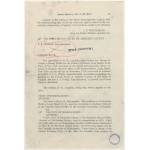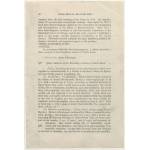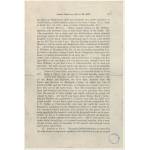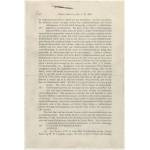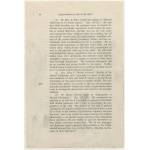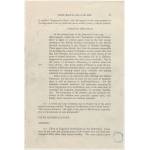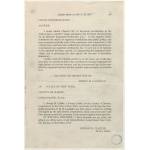Deposition of Harry H. Laughlin
11/12/1925
Add to Favorites:
Add all page(s) of this document to activity:

Add only page 1 to activity:
Add only page 2 to activity:
Add only page 3 to activity:
Add only page 4 to activity:
Add only page 5 to activity:
Add only page 6 to activity:
Add only page 7 to activity:
Add only page 8 to activity:
Add only page 9 to activity:
Add only page 10 to activity:
Add only page 11 to activity:
This document comes from the case file for Buck v. Bell, concerning the issue of involuntary sterilization. This deposition of eugenicist Harry Laughlin was filed with the Supreme Court Case. In his testimony, Laughlin desecribes Carrie Buck and her family as part of the "shiftless, ignorant, and worthless class of anti-social whites of the South" and that their "feeblemindedness is caused by the inheritance of degenerate qualities" that she is the "potential parent of social inadequate or defective offspring."
At 17 years old, Carrie Buck became pregnant (later reported to have been the result of rape, allegedly by a relative of her foster parents). Shortly after the birth of her child, her foster parents had her committed to the “Virginia Colony for Epileptics and Feeble-Minded” on the grounds of feeble-mindedness, incorrigible behavior and promiscuity. Buck was declared mentally incompetent and her daughter was taken away from her.
Albert S. Priddy, the superintendent of the “Colony for Epileptics and Feeble-Minded,” used Carrie to test the legality of Virginia’s involuntary sterilization law. John H. Bell replaced Priddy after his death in 1925.
On May 2, 1927, the U.S. Supreme Court upheld the state’s statute allowing for the sterilization of people who were thought of as “unfit,” including the intellectually disabled. Justice Oliver Wendell Holmes, Jr. delivered the majority opinion of the Court, including: “It is better for all the world if, instead of waiting to execute degenerate offspring for crime or to let them starve for their imbecility, society can prevent those who are manifestly unfit from continuing their kind….Three generations of imbeciles are enough.” (This referenced the fact that Buck’s mother had been committed to a state institution, Buck’s diagnosis, and the assumption in the Court’s opinion that Buck’s children would be “socially inadequate.”)
Bell performed Buck’s sterilization on October 19, 1927. She was the first person involuntarily sterilized under Virginia’s Laws for the sterilization of persons considered “unfit” — an estimated 8,300 Virginians were sterilized under the state law from 1927 to 1972.
At 17 years old, Carrie Buck became pregnant (later reported to have been the result of rape, allegedly by a relative of her foster parents). Shortly after the birth of her child, her foster parents had her committed to the “Virginia Colony for Epileptics and Feeble-Minded” on the grounds of feeble-mindedness, incorrigible behavior and promiscuity. Buck was declared mentally incompetent and her daughter was taken away from her.
Albert S. Priddy, the superintendent of the “Colony for Epileptics and Feeble-Minded,” used Carrie to test the legality of Virginia’s involuntary sterilization law. John H. Bell replaced Priddy after his death in 1925.
On May 2, 1927, the U.S. Supreme Court upheld the state’s statute allowing for the sterilization of people who were thought of as “unfit,” including the intellectually disabled. Justice Oliver Wendell Holmes, Jr. delivered the majority opinion of the Court, including: “It is better for all the world if, instead of waiting to execute degenerate offspring for crime or to let them starve for their imbecility, society can prevent those who are manifestly unfit from continuing their kind….Three generations of imbeciles are enough.” (This referenced the fact that Buck’s mother had been committed to a state institution, Buck’s diagnosis, and the assumption in the Court’s opinion that Buck’s children would be “socially inadequate.”)
Bell performed Buck’s sterilization on October 19, 1927. She was the first person involuntarily sterilized under Virginia’s Laws for the sterilization of persons considered “unfit” — an estimated 8,300 Virginians were sterilized under the state law from 1927 to 1972.
This primary source comes from the Records of the Supreme Court of the United States.
National Archives Identifier: 45637229
Full Citation: Deposition of Harry H. Laughlin, Assistant Director of Eugenics Record Office of Carnegie Institute; 11/12/1925; Buck v. Bell (Case File #31681); Appellate Jurisdiction Case Files, 1792 - 2010; Records of the Supreme Court of the United States, Record Group 267; National Archives at Washington, DC. [Online Version, https://www.docsteach.org/documents/document/deposition-of-harry-laughlin-eugenics-buck-v-bell, April 20, 2024]Rights: Public Domain, Free of Known Copyright Restrictions. Learn more on our privacy and legal page.



